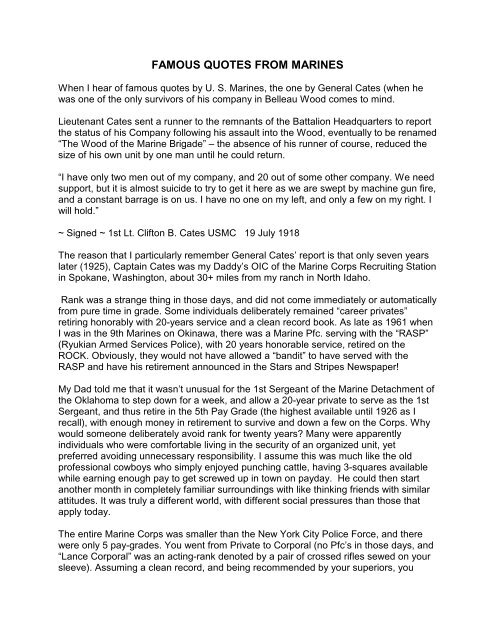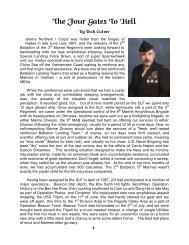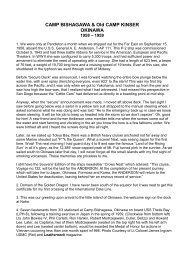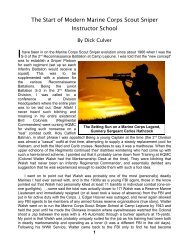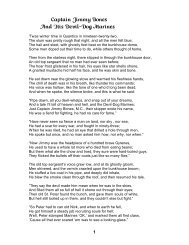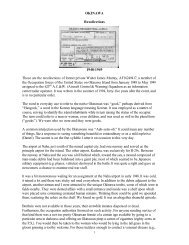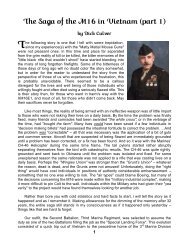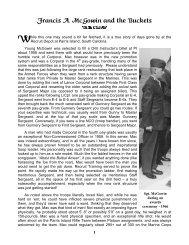FAMOUS QUOTES FROM MARINES - Rohrer, Bob Rohrer
FAMOUS QUOTES FROM MARINES - Rohrer, Bob Rohrer
FAMOUS QUOTES FROM MARINES - Rohrer, Bob Rohrer
You also want an ePaper? Increase the reach of your titles
YUMPU automatically turns print PDFs into web optimized ePapers that Google loves.
<strong>FAMOUS</strong> <strong>QUOTES</strong> <strong>FROM</strong> <strong>MARINES</strong><br />
When I hear of famous quotes by U. S. Marines, the one by General Cates (when he<br />
was one of the only survivors of his company in Belleau Wood comes to mind.<br />
Lieutenant Cates sent a runner to the remnants of the Battalion Headquarters to report<br />
the status of his Company following his assault into the Wood, eventually to be renamed<br />
“The Wood of the Marine Brigade” – the absence of his runner of course, reduced the<br />
size of his own unit by one man until he could return.<br />
“I have only two men out of my company, and 20 out of some other company. We need<br />
support, but it is almost suicide to try to get it here as we are swept by machine gun fire,<br />
and a constant barrage is on us. I have no one on my left, and only a few on my right. I<br />
will hold.”<br />
~ Signed ~ 1st Lt. Clifton B. Cates USMC 19 July 1918<br />
The reason that I particularly remember General Cates’ report is that only seven years<br />
later (1925), Captain Cates was my Daddy’s OIC of the Marine Corps Recruiting Station<br />
in Spokane, Washington, about 30+ miles from my ranch in North Idaho.<br />
Rank was a strange thing in those days, and did not come immediately or automatically<br />
from pure time in grade. Some individuals deliberately remained “career privates”<br />
retiring honorably with 20-years service and a clean record book. As late as 1961 when<br />
I was in the 9th Marines on Okinawa, there was a Marine Pfc. serving with the “RASP”<br />
(Ryukian Armed Services Police), with 20 years honorable service, retired on the<br />
ROCK. Obviously, they would not have allowed a “bandit” to have served with the<br />
RASP and have his retirement announced in the Stars and Stripes Newspaper!<br />
My Dad told me that it wasn’t unusual for the 1st Sergeant of the Marine Detachment of<br />
the Oklahoma to step down for a week, and allow a 20-year private to serve as the 1st<br />
Sergeant, and thus retire in the 5th Pay Grade (the highest available until 1926 as I<br />
recall), with enough money in retirement to survive and down a few on the Corps. Why<br />
would someone deliberately avoid rank for twenty years? Many were apparently<br />
individuals who were comfortable living in the security of an organized unit, yet<br />
preferred avoiding unnecessary responsibility. I assume this was much like the old<br />
professional cowboys who simply enjoyed punching cattle, having 3-squares available<br />
while earning enough pay to get screwed up in town on payday. He could then start<br />
another month in completely familiar surroundings with like thinking friends with similar<br />
attitudes. It was truly a different world, with different social pressures than those that<br />
apply today.<br />
The entire Marine Corps was smaller than the New York City Police Force, and there<br />
were only 5 pay-grades. You went from Private to Corporal (no Pfc’s in those days, and<br />
“Lance Corporal” was an acting-rank denoted by a pair of crossed rifles sewed on your<br />
sleeve). Assuming a clean record, and being recommended by your superiors, you
“might” be advanced to Corporal during your second enlistment. Generally speaking you<br />
could make one rank per hashmark without being considered to be a fanny-kisser.<br />
Promotions within the enlisted ranks were organizational, and if you were transferred to<br />
a new unit without an opening for say (Sergeant?) and if you were currently wearing<br />
three stripes, you had to take a bust back to the next highest rank available. Individuals<br />
being transferred (or considering transfer) were sometimes known to “shop around” for<br />
a unit having a vacancy in the rank held by the “transferee”… For those who remember<br />
the movie written by James Jones about the pre-WWII Army at Scofield Barracks,<br />
“From Here to Eternity,” 1st Sergeant Warden was speaking of looking to transfer out of<br />
his unit (he and the Company Commander were not exactly close friend, although he<br />
and the Captain’s wife were). Warden mentioned that he had located a company with a<br />
vacancy for a 1st Sergeant. Unless you were familiar with the promotional systems of<br />
both the Army and the Marine Corps of the pre-WWII Service, you might well have<br />
missed a “correct” notation on service life of the time.<br />
Strangely enough, there were some units in the Marine Corps that still had<br />
organizational promotions even following WWII. It wasn’t until after Korea that the<br />
“paperwork Marine Corps” gradually took over, and such things as promotion exams,<br />
and promotion boards became the norm.<br />
BACK TO THE STORY…<br />
My Dad, having finished a tour with the Marine Detachment on the USS Oklahoma, and<br />
having fought in the Haitian Campaign, (his squad captured a brass Gatling Gun that<br />
sat for years outside the Navy Department Headquarters in Washington, D.C.), his first<br />
enlistment came to an end. He had studiously avoided any promotions during his first<br />
enlistment. It seems that he had enlisted under the pay provisions that had been<br />
enacted for “The Great War” which were somewhat greater than the pre-war WWI pay<br />
grades. Following the war, the old pay provisions came back into play, and if you took a<br />
promotion, you had to agree to be paid under the peacetime pay grades. My Dad was<br />
drawing an additional $5.00/month for Expert Rifleman, $5.00/month as a 1st Class Gun<br />
Pointer on his 5” Gun Mount, was drawing $3.00/month as a 2nd Class Signalman<br />
(signal-flags), …and was cutting hair in his spare time in the Ship’s Barber Shop (which<br />
would not have been allowed as an NCO). In short, he would have lost money by taking<br />
a promotion. He was also the (Ship’s) Captain’s orderly – a position only assigned to<br />
extremely squared away young Marines, so he wasn't what they used to call a “yardbird”.<br />
He was offered promotion to Corporal but figured that he would have lost money<br />
by doing so.<br />
He spent a few weeks considering his future course of action, and re-enlisted. He made<br />
Corporal almost immediately, and Sergeant shortly thereafter. All of a sudden he was in<br />
the position of having made it to the 3rd pay-grade (Sergeant) with only one hashmark!<br />
Upppssss… He was (fortunately I assume), assigned to Recruiting Duty in Spokane, as<br />
I mentioned before, under Captain Clifton B. Cates.
Having finished his second hitch in the Marine Corps, with a bit of time out training of<br />
the Mexican Banditos with the Lewis Machine Gun, he and a friend went into the<br />
construction business in San Diego, only to be caught in the Depression in 1929. On his<br />
way back to Alabama (he hadn’t been home in about 10-years), he stopped to see an<br />
old friend, <strong>Bob</strong> Crowder, from the Marine Detachment on the USS Oklahoma (circa)<br />
1919 who was then on the Dallas Police Force. <strong>Bob</strong> Crowder eventually retired as the<br />
Captain of B Company, Texas Rangers in the early 1970s).<br />
When back in Alabama, my Pap was about to reenlist in the Corps, he heard about a<br />
“new” Civil Service Exam being given for the Federal Prison System (the Bureau of<br />
Prisons had been manned using the “spoils system” prior to the new exam system). He<br />
took the exam, passed with high marks, and was offered a job at considerably higher<br />
pay than Corps was willing to pay. He advanced steadily making Lieutenant of the<br />
Guards, and being assigned as one of the 1st five Lieutenants assigned to Alcatraz in<br />
1934. He eventually became an Associate Warden (formerly called Deputy Warden) of<br />
the lockup in Tallahassee, Florida when the Japanese bombed his old Battleship the<br />
Oklahoma. He reenlisted in the Marine Corps without notifying the Federal Bureau of<br />
Prisons, and was made a “gen-u-wine” 1st Lieutenant considering his prior experience.<br />
This time he stayed in the Marine Corps Reserve following WWII, eventually advancing<br />
to Lt. Col. prior to his retirement in 1963.<br />
FAST FORWARD TO 1952…<br />
My Dad was then a Major in the Marine Corps Reserve, and had advanced to Warden<br />
of the Federal Facility at Petersburg, Virginia. Following the “dust-up” in Korea, they<br />
were rebuilding the Marine Corps Reserve and they had decided to establish a Reserve<br />
Marine Rifle Company at Ft. Lee, Virginia (essentially adjacent to the Federal Prison).<br />
They asked my Dad to become the Commanding Officer in 1953, which he gladly<br />
accepted.<br />
He had to make some sort of meeting at the Federal Bureau of Prisons, and it being in<br />
the Summer, I went along with him (to wander around loosely on my own in<br />
Washington, D.C. looking at the sights – try THAT now, whew!). In those days however,<br />
virtually all individuals wore suits when making conferences and similar meetings, and<br />
he was so attired when we made a stop at Quantico. While we were heading up the<br />
steps to “Little Hall” (the location of the old PX), there was a nicely dressed individual<br />
also dressed in a civilian coat and tie coming down the steps.<br />
This gentleman and my Dad stopped and shook hands and engaged in a conversation<br />
that must have lasted about an hour or better. I listened with great interest, and it was<br />
obvious that he and my Dad were old friends. After we parted company, my Dad and I<br />
went up the steps to the Exchange. Unable to contain my curiosity, I asked him who the<br />
individual was that he was trading stories with? “Why that was General Cates,” he<br />
informed me. General Cates had finished his tour as the Commandant in 1951, and<br />
apparently not being ready to hang it up as a Marine, he asked permission to step down<br />
a rank and assume Command of Quantico for a final tour. Permission was granted, and
General Cates finished his tour, was given his Commandant’s stars back and finally<br />
retired from the Corps some 38-years after sending the message to his Battalion<br />
Commander in Belleau in July 1918.<br />
A different day, a different time, and perhaps a different Corps – we used to win our<br />
wars in those days (or at least wind ‘em up in a stalemate, if you count Korea).<br />
Semper Fidelis,<br />
Dick


